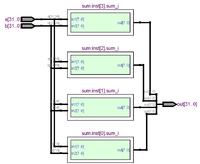omara007
Advanced Member level 4
- Joined
- Jan 6, 2003
- Messages
- 1,237
- Helped
- 50
- Reputation
- 102
- Reaction score
- 16
- Trophy points
- 1,318
- Location
- Cairo/Egypt
- Activity points
- 9,716
verilog module instantiation
Hi folks
How can I make a conditional instantiation of a certain module in Verilog. In other words, if I have a parameter like (number_of_ports) sit to a specific value .. say '32' .. and I want to instantiate a certain module 32 times accordingly .. I need something to check for the value of this variable and generate the required instances accordingly .. and if I change the value of this variable, the number of instantiated modules will change as a result ..
In VHDL, this is simply implemented as (generate) statement .. if gives you the option to instantiate a generic instance inside the generate loop .. and you easily pass the desired number of instances as the loop counter ..
How can this be implemented in Verilog ?
Hi folks
How can I make a conditional instantiation of a certain module in Verilog. In other words, if I have a parameter like (number_of_ports) sit to a specific value .. say '32' .. and I want to instantiate a certain module 32 times accordingly .. I need something to check for the value of this variable and generate the required instances accordingly .. and if I change the value of this variable, the number of instantiated modules will change as a result ..
In VHDL, this is simply implemented as (generate) statement .. if gives you the option to instantiate a generic instance inside the generate loop .. and you easily pass the desired number of instances as the loop counter ..
How can this be implemented in Verilog ?
